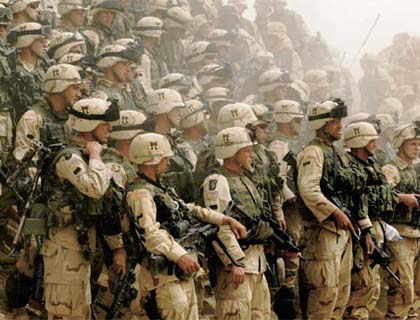Seemingly, bipartisanism has been functioning quite well in the US and non-parties—Republican and Democratic— are able to settle issues alone. As we know that former President Bush waged war both in Afghanistan in 2001, and Iraq 2003. That time Republicans were supporting wars overwhelmingly and, due to vengeful and hatred-filled environment caused by the incident of 9/11, common people were supporting too. While both wars were not supported much by members of Democratic Party, particularly, after 2008 global economic recession that hit Americans hard. That circumstance was critical and both political and economic situation was in inconvenient state, which finally helped Obama to win the White House.
In that juncture, the popularity of Iraq's war and the country's strategic position in the region, which many top foreign analysts were maintaining that democratization of Iraq actually was "a push button for democratization of the entire region, particularly, Arab world, potentially pushed the war in Afghanistan to periphery of main Washington's political scenario. Obviously, the process reversed when President Obama appeared and heralded people with promising fundamental change. What he did was reassessment of the US military strategy and focused back to Afghanistan, while he made steep military pullout from Baghdad. In new strategy, he became committed to surge military in Afghanistan as 33,000 more armies were added to the already existing one in 2010.
No doubt, both wars had already lost their popularity, and Americans, particularly after economic challenges caused by 2008 financial crisis, were not supporting much. Such mounting anti-war attitude was not restricted to common people at all rather key Congress Senators and MPs were pushing for projects at home rather than disputes in Kabul and Baghdad. They have maintained that pouring taxed dollars for national building or for cracking down Taliban-led militants in Afghanistan, indeed, is wastage of human resource, money, and time. But President Obama promised them something mouth-watering—surging troops to Afghanistan, cracking down and soon after "coming back home". The promise and confidence of President persuaded many and they found that face-saving pullout, elimination of terror networks, and maintenance of US strategic supremacy, values to vote for his plan.
That time finally arrived and it is President's turn to keep his promise. Senators and MPs were expecting him to start military drawdown. Wednesday, June 22, 2011, was somehow a deadline for his promise made 18 months ago. Ultimately, he made his mind and decided to remain committed to his promise in order to persuade his oppositions at home. In his long-awaited address, he determined the numbers of US military to pull out of the Afghanistan. From the very start of the plan around five thousand will leave the country and five thousand more will be pulled out in December of the current year. The remaining 23,000, from total 33,000 troops that Obama surged in 2010, will be withdrawn till September next year.
The US top American commanders actually disagreed with him and opined that the withdrawal is hasty as well as too steep. As the Top US and NATO commander in Afghanistan, General David Patraeus said Thursday that he disagreed with President Barack Obama's decision for a troop drawdown in Afghanistan. "The ultimate decision was a more aggressive formulation in terms of the timeline than what we had recommended". As well, The US military's top officer, Admiral Mike Mullen Friday told Congress that President Barack Obama's decision to withdraw up to 33,000 troops from Afghanistan by next summer is riskier than he originally was prepared to endorse. He told a House hearing that he supports the president's plans, but he said they are "more aggressive and incur more risk" than he originally thought was prudent.
He added that keeping more troops in Afghanistan for a longer period would have been a safer course, given the fragile state of security there.
There is not a comprehensive agreement among political circles too, but political officials prefer the pullout much. What can be the reason? There are, I think, three main reasons for such a change.
One: Americans are increasingly turning against war in Afghanistan as they find it boring and exhaustive. Nowadays, the high rate of unemployment, more than nine percent, huge budget deficit, inconvenient fiscal year, and giant sovereign debt all are the factors that discourage people to keep appreciation of a war which is costing Americans two billion dollars a week. They ask government to do something for their routine misery, something real to change the current and outlook of the grim picture of their life and their children's life rather pouring taxed dollars to Afghanistan.
Second: no one doubts the waged war in Afghanistan was to persecute culprits of 9/11 incidents or, particularly, Osama bin Laden. The war was not against Taliban regime or Taliban government. If Taliban handed over Osama bin Laden, Bush's attack on Afghanistan was somehow unlikely. Now Americans feel that their main enemy does not exist any more. Osama was assassinated, thus, let Afghans cope with their own problem. And many top Washington officials maintain too that hunting terrorists and eliminating their masterminds is far less dangerous as well as less costly if the US armies organize attacks like that of Abbotabad.
And finally, the third factor is coming Presidential Election. Democratic Party lost the lower house to the G.O.P. and since then many programs of US President have been blocked in the House. The presidential Election is far tougher then the parliamentary ones and both parties try their best in order to entice Americans to cast vote in favor. If the current ruling officials do not do something in order to appease the increasing angers of people, then should not expect them to vote for. Therefore, President Obama, though his top military officers and commanders disagree, made resolute decision to take out complete 33 thousand troops by next September in order to meet civilians' concern.

